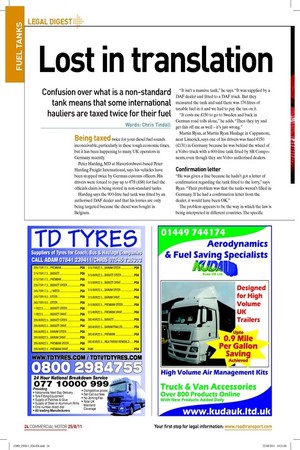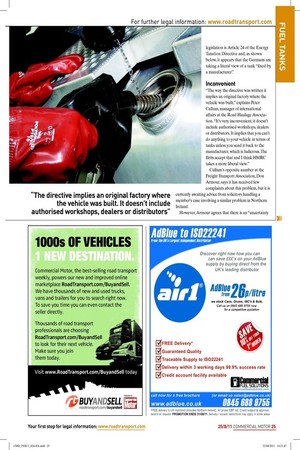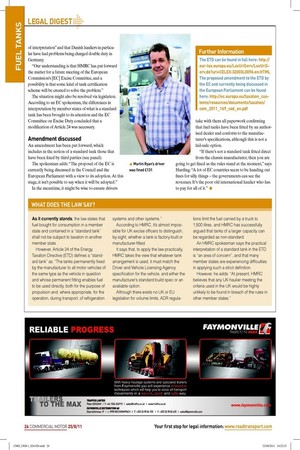Lost in translation
Page 20

Page 21

Page 22

If you've noticed an error in this article please click here to report it so we can fix it.
Confusion over what is a non-standard tank means that some international hauliers are taxed twice for their fuel
Words: Chris Tindall
Being taxed twice for your diesel fuel sounds inconceivable, particularly in these tough economic times, but it has been happening to many UK operators in Germany recently.
Peter Harding, MD at Haverfordwest-based Peter Harding Freight International, says his vehicles have been stopped twice by German customs oficers. His drivers were forced to pay up to €78 (£68) for fuel the oficials claim is being stored in non-standard tanks.
Harding says the 900-litre fuel tank was itted by an authorised DAF dealer and that his lorries are only being targeted because the diesel was bought in Belgium. “It isn’t a massive tank,” he says. “It was supplied by a DAF dealer and itted to a DAF truck. But they measured the tank and said there was 176 litres of taxable fuel in it and we had to pay the tax on it.
“It costs me £150 to go to Sweden and back in German road tolls alone,” he adds. “Then they try and get this off me as well – it’s just wrong.” Martin Ryan, at Martin Ryan Haulage in Cappamore, near Limerick, says one of his drivers was ined €150 (£131) in Germany because he was behind the wheel of a Volvo truck with a 600-litre tank itted by SB Components, even though they are Volvo authorised dealers.
Confirmation letter
“He was given a ine because he hadn’t got a letter of conirmation regarding the tank itted to the lorry,” says Ryan. “Their problem was that the tanks weren’t illed in Germany. If he had a conirmation letter from the dealer, it would have been OK.” The problem appears to be the way in which the law is being interpreted in different countries. The speciic legislation is Article 24 of the Energy Taxation Directive and, as shown below, it appears that the Germans are taking a literal view of a tank “ixed by a manufacturer”.
Inconvenient
“The way the directive was written it implies an original factory where the vehicle was built,” explains Peter Cullum, manager of international affairs at the Road Haulage Association. “It’s very inconvenient; it doesn’t include authorised workshops, dealers or distributors. It implies that you can’t do anything to your vehicle in terms of tanks unless you send it back to the manufacturer, which is ludicrous. The Brits accept that and I think HMRC takes a more liberal view.” Cullum’s opposite number at the Freight Transport Association, Don Armour, says it has received few complaints about this problem, but it is currently awaiting advice from solicitors handling a member’s case involving a similar problem in Northern Ireland.
However, Armour agrees that there is an “uncertainty of interpretation” and that Danish hauliers in particular have had problems being charged double duty in Germany.
“Our understanding is that HMRC has put forward the matter for a future meeting of the European Commission’s [EC] Excise Committee, and a possibility is that some kind of tank certiication scheme will be created to solve the problem.” The situation might also be resolved via legislation. According to an EC spokesman, the differences in interpretation by member states of what is a standard tank has been brought to its attention and the EC Committee on Excise Duty concluded that a modiication of Article 24 was necessary.
Amendment discussed
An amendment has been put forward, which includes in the notion of a standard tank those that have been ixed by third parties (see panel).
The spokesman adds: “The proposal of the EC is currently being discussed in the Council and the European Parliament with a view to its adoption. At this stage, it isn’t possible to say when it will be adopted.” In the meantime, it might be wise to ensure drivers take with them all paperwork conirming that fuel tanks have been itted by an authorised dealer and conform to the manufacturer’s speciications, although this is not a fail-safe option.
“If there’s not a standard tank itted direct
from the chassis manufacturer, then you are going to get ined as the rules stand at the moment,” says Harding. “A lot of EC countries seem to be handing out ines for silly things – the governments can see the revenues. It’s the poor old international haulier who has to pay for all of it.” ■














































